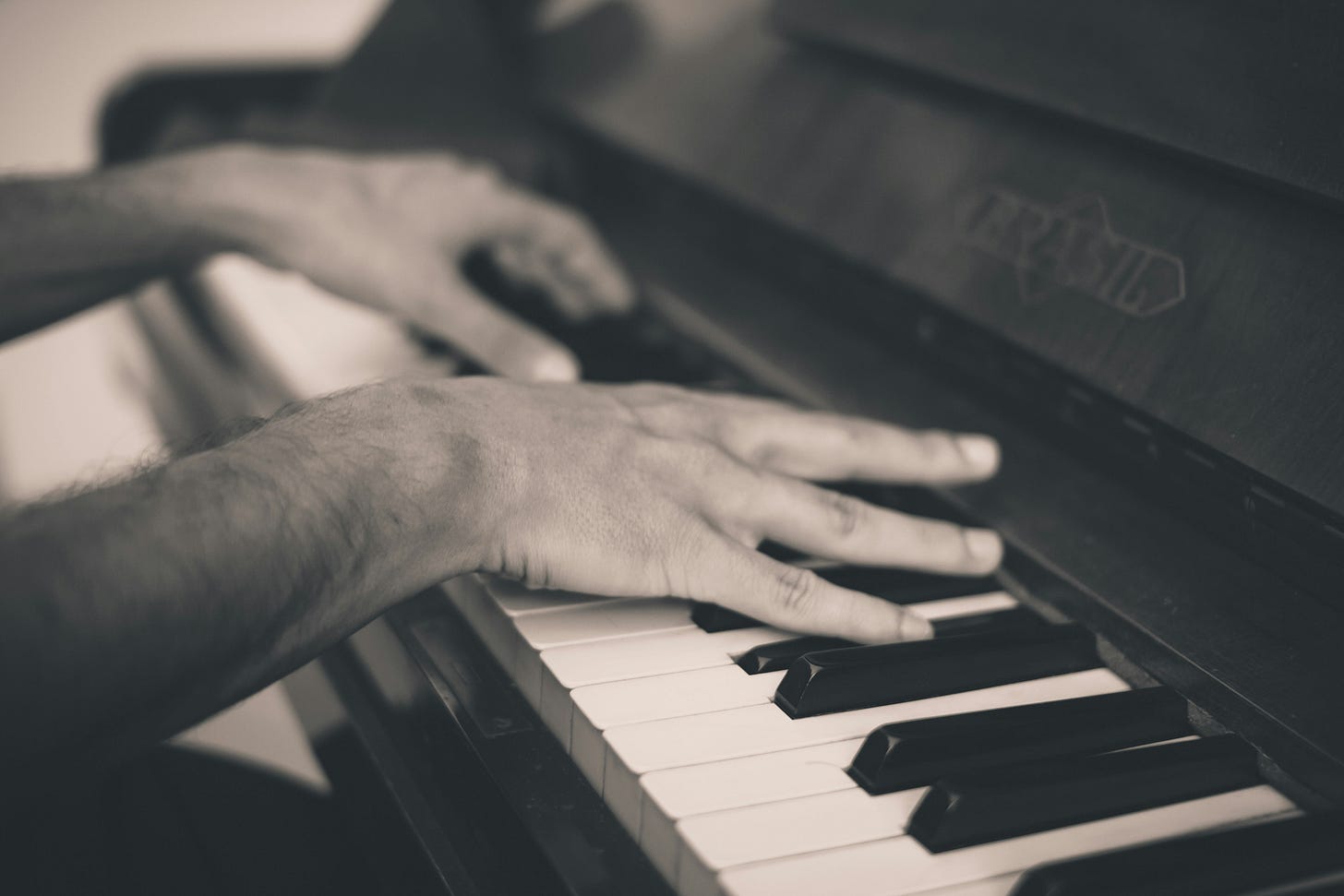Sound That Breaks Worlds
How Experimental Music and the Book of Revelation Help Me Hear Anew
My Happy Place is Full of Sound
It’s a marker of exciting live music to come when small plastic bags of ear plugs are placed on a table upon entering a concert space. It shows thoughtfulness. It’s not an afterthought, and it’s not a Metallica concert, where everyone knows to bring earplugs, or just doesn’t care. The organizers of the Bang on a Can “Loud” festival at MASS MoCA (Massachusetts Museum of Contemporary Art) understand that the music presented spans sound spectrums—one piece could be soft and eerie, the next dissonant and thunderous. This particular performance, by percussion instrumentalist Matt Evans, is loud. But I left my earplugs unused, preferring instead to feel the throb of bass, the controlled splash of cymbal, and the aching whine of reverb.
Founded in 1987, Bang on a Can has pushed the boundaries of “new/contemporary” music in avant-garde circles for decades. Rejecting overly formal and academic music trends, they sought to create music that was compositionally rigorous, exciting, and that an audience would actually enjoy. They held all-day and night “marathon” concerts, paid homage to avant-garde trailblazers John Cage and George Crumb, and eventually formed the “Bang on a Can All Stars,” a kind of new-music rock band made up of instrumental virtuosos. This crew began touring, often in contemporary art museums, performing music that was often weird, often wild, and that—to this listener, at least—feels like a revelation.
Here’s a melodic, delightful piece called “Reeling” inspired by French Canadian folk music:
I’m still discovering why, but the annual Bang on a Can festival at MASS MoCA brings me to my happy place. It’s a culmination event of a summer residency for young musicians that has been taking place for more than twenty years. During this festival, I wander galleries, hop from show to show, bob my head to unexpected sounds or trance-like rhythms, often wearing a goofy, happy grin. One of my highlights this year was a piece called “Forbidden Love,” written by Bang on a Can co-founder Julia Wolfe and performed by the So Percussion quartet on violins, cello, and viola. But when I say performed, what I mean is that the So Percussion folks strummed, tapped, and thumped sounds from these instruments, not that they played the stringed instruments the typical way with bows. Check it out. Surprising and wonderful stuff:
Cracking the Pavement of the Status Quo
I experience Bang on a Can’s music as more than an awakening to newness—I hear instead an apocalyptic impulse.
“Apocalyptic” is not only a genre but an impulse.
The genre uses terrifying symbols of worlds ending to wake up readers to imagine a better world in the present. The apocalyptic impulse threads through religion, politics, and culture whenever we are stopped in our tracks by truth, led behind the “veil” to a deeper experience and perception of reality. An inbreaking of often-shocking newness often initiates such unveiling. I follow the inspiration of a writer named David Dark, whose book Everyday Apocalypse scours pop culture for marks of the apocalypse. But like me, he’s not chasing down conspiracy theories about the end times, biblical code-breaking about what texts like Revelation “really mean,” or divine world destruction. He’s looking to television shows like The Simpsons, writers like Flannery O’Connor, or musical bands such as Radiohead, to demonstrate an apocalyptic way of being in the world. This way of being welcomes a deeper dimension of reality that by its nature disrupts the habitual and often unjust order of things.
Apocalyptic, like the far reaches of musical exploration charted by Bang on a Can, “cracks the pavement of the status quo,” says Dark.
Apocalyptic … irritates and disrupts the feverishly defended norms of whatever culture it engages.It is the place where the future pushes into the present. It’s the breaking in of another dimension, a new wine for which our old wineskins are unprepared. That which apocalyptic proclaims cannot be fit into existing ways of thinking.” —David Dark
Revelation and Resistance Music
When I listen to Bang on a Can, I also think of the book of Revelation’s trumpet blasts and resistance hymns. Both crack the pavement of the status quo. There are at least seven such hymns in Revelation, musical interludes tucked between visions of beasts and divine thrones. In Revelation, such hymns offer praise to God and the “Lamb who was slain” (5:12), subverting the power of the Roman Empire. Every “Yes” to God in Revelation is a “No” to Caesar and his power. The “Yes” of creativity in the music of Bang on a Can is necessitated by a “No” to the status quo of sentimental popular music, as well as classical music overly determined by stodginess or academic considerations.
In the truths told and evoked by such music, ancient and new, we glimpse something beyond the veil. What we’re glimpsing is not entirely clear yet, but it pulses, aches, and sings. Maybe it’s the outline of a new world erupting not through domination or fear, but through creativity and love.
Apocalypse is about seeing reality and ourselves as they are.
Apocalypse is about old certainties being shattered.
Apocalypse is about the inbreaking of new worlds.
Where have you encountered “apocalyptic music”? What song, voice, or dissonant truth helped you see more clearly? Hit reply or leave a comment—I’d love to hear.



Ear-opening. Thank you, Mark.
I love Bang on a Can too!! The first gallery piece I heard this year—in the Vincent Valdez installation—was “How to Win an Election”—unbelievably wonderful voice and bass clarinet! With words taken from Cicero’s advice to his brother who was running for Consul. Soooo resonated with our apocalyptic here and now!